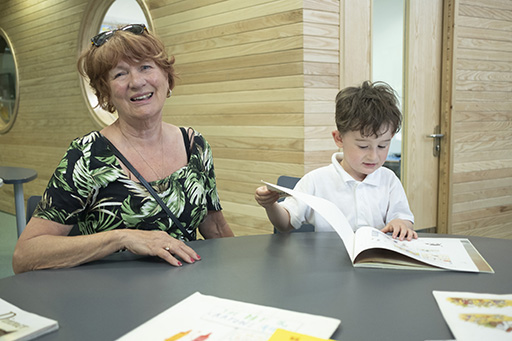5 Reading volunteers
Reading volunteers can play an important role in developing less-engaged children’s pleasure, assurance and ability as readers. Often drawn from the local community, they may be parents or grandparents, community members or adults from the corporate sector linked to reading volunteer organisations. There is relatively little research evidence on the benefits of such reading partnerships, although some, such as the US based volunteer tutoring programme HOSTS (Burns et al., 2008) and the Experience Corps (Morrow-Howell et al., 2009), indicate short and long-term effects for reading skills, including fluency and comprehension.

Volunteers are frequently motivated to help children directly (Tracey et al., 2014), however this can result in doing too much for the child and reducing their agency as a reader. To avoid this and ensure helpers develop children’s confidence to voice their views and become active meaning makers, training is necessary. In the UK, the reading charity Coram Beanstalk not only requires volunteers to complete focused training before offering one-to-one support, but it also includes ongoing support and clarity about the focus of the work. Schools, too, invite parents and local community members to volunteer and support readers, this work often prioritises listening to children read and helping them use their reading skills, but volunteers also need help to nurture choice-led read and the child’s desire to read.
Activity 4 Supporting reading volunteers
Imagine you are going to run a short support session for reading volunteers whose remit is to support children’s Reading for Pleasure. Make a note of the key elements you want to highlight that will help them in their one-to-one or small group sessions.
Comment
A key element will be getting to know each reader well. This includes learning about their interests, attitudes and skills, finding texts which have relevance for the child and sharing these enthusiastically, but always offering choice. Developing strong reciprocal reader relationships, focused support that responds to needs and making the experience personal and pleasurable is also important.
RfP training also needs to focus on the impact of nurturing children’s desire to read, on developing the adult’s knowledge of children’s texts and of readers, and on RfP pedagogy (read-aloud, book talk, recommendations, and time to read in a social reading environment). Understanding the need to notice, document, reflect and act upon the child’s response is key (recall Session 5, Section 9 which explores this process).
Volunteers often work in available spaces around school, which also need to showcase the power and pleasure of reading. It is this wider school reading environment that you will look at next.
